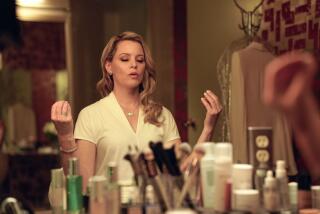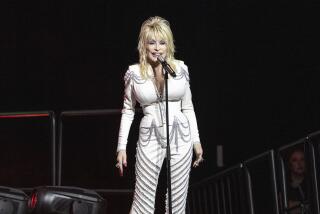A skin-care line that is not just another pretty toxic face
Gregg Renfrew wants to change the way people live, starting with their cosmetics.
Sitting in her light-filled office in Santa Monica, Renfrew rattles off the statistics she finds most alarming when it comes to some of the lotions, sprays and powders we apply to our bodies on a daily basis.
“Did you know that there has not been a federal law passed since 1938 governing the cosmetics industry? And there are close to 12,000 ingredients used in all personal care products, from toothpaste to shampoo, lipstick to lotion, 80% of which have never been tested for safety on human health.”
The self-described serial entrepreneur and mother of three young children was inspired to find better alternatives after watching “10 Americans,” a film released in 2006 by the nonprofit watchdog organization Environmental Working Group about babies in utero being exposed to hundreds of chemicals and pollutants. Renfrew began replacing her own family’s household cleaners and grooming products with more healthful alternatives she found through her research.
She quickly realized that there seemed to be a shortage of chic and stylish beauty lines that also prioritized human health. Renfrew — founder of the Wedding List (an online bridal registry service that she sold to Martha Stewart in 2001) and former chief executive of children’s clothing line Best & Co. — was determined to fill the gap in the market.
The result is her new company Beautycounter, which aims to build both a brand of personal care products and a community that can educate consumers. It also has pledged to donate to three nonprofits, including Environmental Working Group, that focus on eliminating unhealthful ingredients and harmful chemicals from the environment.
The line is formulated free of known carcinogens, endocrine blockers or elements harmful to reproductive health. Products do not contain any of the 1,300 chemical ingredients banned by the European Union for cosmetic use or the 11 banned in the U.S.
There is also a “Never List” of nearly 30 ingredients the company vows not to include in any products. Some are obvious offenders, such as formaldehyde and mercury. Others are best left to a green chemist to decipher.
“We want people to feel we’ve done the homework for them,” Renfrew says. “Unless you have a PhD in chemistry, you can barely begin to read the back of a beauty label.”
Renfrew stresses Beautycounter’s message of transparency over perfection. If new information shows that an ingredient used in a Beautycounter product is potentially harmful, the company will make necessary changes to the formulation so the product is safe. “We want you to be an informed consumer,” says Renfrew, “and we’re gonna tell you everything.”
She says that the philosophy of the line is not to scare and that it is far from soapbox-driven. “It’s not that I’m so hard core. I just wanted a product that I could feel is safe for my health and allowed me to be the woman I am today,” she says. “I didn’t like having to choose between health or style or performance. I don’t think that’s right.”
Ken Cook, president and founder of Environmental Working Group, says the beauty market is bound to see more companies adopting a health-minded attitude when it comes to their products.
“I think you’re going to see more brands using ingredients that are safe for human health. And eventually, the big companies are going to have to respond and do something about safety and health, because companies like Beautycounter are leading the way, and pretty soon consumers aren’t going to settle for less.”
Beautycounter is building on the well-established direct-selling system used by Avon and Mary Kay by organizing a nationwide network of “consultants” to market products. Renfrew refers to the method as “social selling” and says Beautycounter consultants can integrate modern technology and social media with the traditional direct sales model.
“We took a look at the direct selling model and where it had been and wanted to combine that with where we are today in order to create a new social selling model that allows people to sell 24/7,” Renfrew says.
For an initial $85 starter fee, consultants are equipped with marketing materials and training guides, their own websites where people can directly buy products from them and a 25% discount on products they want to buy as part of their selling kits. (Beautycounter donates $10 from each start-up fee to one of the nonprofit organizations it has pledged to aid.)
The company also holds weekly webinars for consultants to educate them about products and the latest findings in the safe cosmetics arena.
But customers can bypass the direct-selling structure and buy straight from the Beautycounter website.
To develop products, Renfrew enlisted the help of a team of industry experts with experience in non-toxic cosmetics. Mia Davis, organizing director of the Campaign for Safe Cosmetics, is Beautycounter’s vice president of health and safety. Celebrity makeup artist Christy Coleman is the vice president of creative design, and she drew from her experience in researching less toxic makeup to use on her clients as she created the first line of products for the company.
Using ingredients such as organic coconut oil and aloe and scents like jasmine and calendula, Coleman created the product line to feel unisex and high-end. For the company’s launch in March, Beautycounter introduced a nine-piece collection called the Essential Skincare line, ranging from $22 for face wash to $68 for body oil.
In April, the company added a hair and body care line of gentle daily shampoo and conditioner and a body wash and polish. A children’s product line is set to debut this month. For fall, Beautycounter’s collection of color cosmetics, including eye shadow, blush, bronzer and lipstick, will bow. Coleman has already been testing the makeup on her clients, sweeping a silky light brown shade across “Girls” writer and actress Lena Dunham’s lids for a February cover of Rolling Stone magazine.
Mascara is the one item that won’t be included in the cosmetics line. Coleman says they have not found a way to formulate the product so that it’s free of toxic ingredients.
“Other than mascara, there’s nothing that I feel I am up against the wall with,” she says. The complete color line will include a lip sheer, two matte bronzers, three duo blushers, a mattifying translucent powder, six eye shadow duos and an assortment of jewel-tone eye pencils.
Coleman says she always considers the look and packaging of each product, ensuring it feels luxurious and stylish. Case in point: the crimson-hued lipstick in the cosmetics collection is housed in a chic Art Deco package and has a faint smell of sweet vanilla. “You’d be perfectly proud walking into any party and pulling that out of your handbag,” she says. “And at the end of the day, you don’t want to think that what you’re buying to be beautiful could be harming you.”






